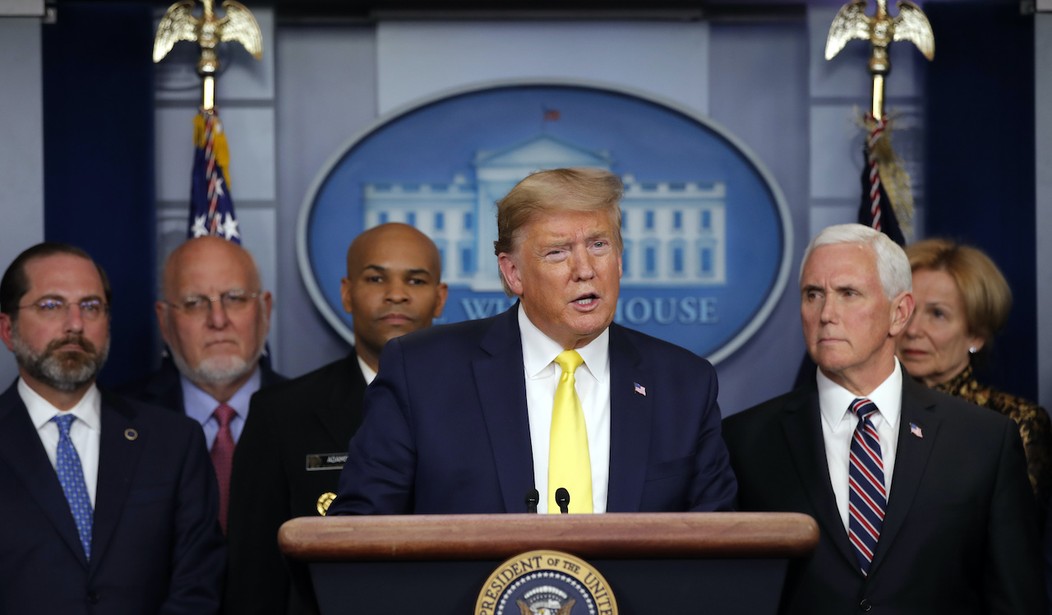As the coronavirus threat grows, we are all hoping to limit its spread, or even better, invent a vaccine. Yet, at the very same time we need new treatments some people are proposing to abandon decades of proven success in innovation policy. Fortunately, there is widespread support and mounting evidence in favor of keeping the pro-innovation approach that has always defined the American spirit.
The American bio-pharmaceutical industry leads the world in innovation. Americans have access to newer treatments, sooner. And that's not all. A recent report highlighted that sector of our economy supports more than 4 million American. A whopping 37 percent of those jobs are in STEM fields, which is more than six times the average in the private sector. And those jobs generate over $66 billion in tax revenue. Altogether, the biopharmaceutical industry adds over $1.1 trillion to the U.S. economy. This is a huge American success story that we shouldn't trifle with. Yet, that is exactly what some are proposing to do.
The best example of this is the Bayh-Dole law. Enacted forty years ago, Bayh-Dole was a way to super-charge the American innovation system by allowing the research institutions to hold the patents arising from federally funded research. For decades this has enjoyed broad, bipartisan support because it was recognized that just throwing money around isn't a solution. If the government keeps the patents on federally funded research, companies aren't going to invest in transforming that research into a marketable product.
This system has been an unqualified success. Much of the federal research money flows to universities, which in turn license their patented discoveries to companies that see a chance for a beneficial consumer product. This has generated over $3 billion in royalty payments to American schools and supported the creation of over 11,000 startup companies. No wonder then, that the Association of University Technology Managers (AUTM) strongly supports the Bayh-Dole law, proudly declaring, "the groundbreaking Bayh-DoleActhas helped universities and their scientific researchers to fulfill [their] public service missions by motivating them to take an active role in ensuring that the fruits of federally supported research ultimately become available to those who need them."
Recommended
All of this is threatened by reckless proposals that would undermine four decades of success. The Bayh-Dole law includes a kind of safety valve called "march-in." If the patented research isn't being used to produce a product, that allows the government to reclaim the patent rights to try to jumpstart productive use. But now some people want to use that to undermine patent rights in products that are already widely available. Their idea is they can turn the march-in safety valve into a mechanism for government price controls. Often this argument is couched in terms of short-term savings at the expense of long-term innovation. But with the growing threat of a global pandemic, the need for maximizing research now has never been clearer.
In a recent interview, the chief of the National Institutes of Health, Francis Collins, pulled no punches about his thoughts of such an abuse of the march-in provision, calling it a "deal breaker." "The march-in approach does not appeal to us at all," he continued, "when I talk to expert legal advisors and the look at the language of the Bayh-DoleAct, it does not appear that march-in was contemplated to be used for an effort to adjust prices." AUTM agrees, warning if the march-in provision is abused, "the private sector likely will be hesitant or unwilling to license federally funded inventions from universities, impeding progress against some of our costliest and most challenging diseases to the detriment of public health and safety.
Health officials, educators, researchers, and job-producing innovators all agree that Bayh-Dole is working and should not be undermined by twisting the march-in provision into a tool of social policy or price fixing. The urgency is even greater now when we want as much effort as possible flowing into preventing or treating the coronavirus. The rest is rhetoric from aspiring politicians and should be disregarded as such.
Steven Tepp is the president and founder of Sentinel Worldwide and Professorial Lecturer in Law at George Washington University Law School. He previously served as senior counsel for Policy and International Affairs at the U.S. Copyright Office and chief intellectual property counsel for the Global Intellectual Property Center at the U.S. Chamber of Commerce.
























Join the conversation as a VIP Member